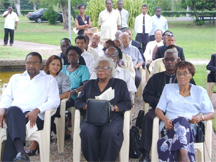Late former President and PNCR leader Desmond Hoyte, SC, was a nationalist to whom fate has been unkind, Opposition Chief Whip Lance Carberry says.

Speaking at a ceremony at Seven Ponds, Place of Heroes, Botanical Gardens to mark the seventh anniversary of Hoyte’s death yesterday, Carberry noted that although PPP/C administrations have been too “blinkered” and “backward” to appreciate the ramifications of the 1989 Economic Recovery Pro-gramme (ERP), it produced positive benefits for the country. “Like any programme which was designed to bring about the economic, social and political transformation of a country like Guyana, the ERP was bound, during its initial phases, to be a dose of very bitter medicine for the population, particularly the traditional constituency of the PNCR,” he told the gathering at the Seven Ponds, Place of Heroes, in the Botanical Gardens.
He added that the ERP eventually took root and after its provisions began to be understood and accepted, it was recognised that it produced positive benefits for the country. According to Carberry, “It was a pity that he was unable to complete the implementation of that programme and it had to be inherited by a regime that was too blinkered and backward to appreciate the totality of its ramifications. Fate was unkind to him!”
Carberry noted that following its 1992 election victory, one of the first acts of the PPP/C administration was the engagement of the services of the Centre for Trans National Corporations to evaluate the privatisation deals undertaken under Hoyte.
He dubbed it “ironic” and said there was a “remarkable silence” after the report was received. He added, “Could you imagine what the result would be if an assessment was done today?”
Hoyte, Carberry noted, had an abiding belief in the values of the “Open Society.” He said Hoyte recognised and understood the influence of the international tide of change that was flowing rapidly through the world by the mid-80s, and which threatened to inundate Guyana- with the vulnerabilities of a small and open economy-if it failed to respond effectively and imaginatively to those changes. He believed that Hoyte felt that the mechanisms in the ERP would have had a transforming effect that would induce “inclusivity.”
Recalling the post-1997 elections period, Carberry said he is convinced that Guyana was at the “tipping point.” However, he said Hoyte did not believe that this would be beneficial for the country and, therefore, “reluctantly surrendered” to the Herdmanston Accord and later the St Lucia Statement. He added that the country was again at the “tipping point” after the 2001 elections, but being a “nationalist” Hoyte “could not allow the situation to follow its natural inclination.” Carberry said Hoyte felt that it was possible to “negotiate” arrangements that would take the society from the “brink,” which is why he initiated the dialogue with President Bharrat Jagdeo.
The dialogue was, however, unsuccessful and Hoyte later expressed dissatisfaction with the implementation of various decisions.
Carberry noted that seven years have passed and memories are beginning to dim, but drew attention to the words of former St Vincent Prime Minister Sir James Mitchell, who said: “If we do not respect our fallen leaders, when are we going to love our history? If the leaders of our time, infused with the arrogance of their own perfection, pay no respect to the foundations of their society, who then will respect their memory when they have not demonstrated to the youth any appreciation of our heritage? How long will our culture of democratic tradition remain in infancy?”





